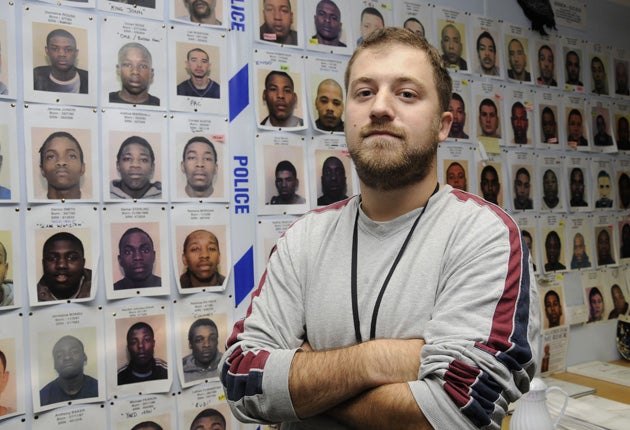Justin Fenton in London: The sound of fireworks reminds me of home
Today marks the first part of a unique collaboration between The Independent and The Baltimore Sun in which our crime correspondent, Mark Hughes, swaps places with his counterpart, Justin Fenton. From the streets of Brixton to Baltimore's projects, we’ll report on the reality of crime in Britain and Baltimore to find out if the shadow Home Secretary is right when he said our streets are going the same way as those portrayed in the US TV series The Wire

Catching some rest after my overnight flight, I woke up to the sound of police sirens and a constant pop-pop-popping outside the Kentish Town flat where I'm staying. I assumed it was fireworks – I would later learn it was part of the Guy Fawkes celebrations – but where I'm from, it was instinctive to wonder if such sounds could also be gunfire.
Vast pockets of blight and neglect are the setting for nightly gun battles in Baltimore, with young men, fighting over drug turf and respect, settling scores with firearms. Though such crimes directly impact a small percentage of the city, there are indirect effects on us all. Despite significant improvements, including a 20-year low in killings last year, the city remains one of the most violent in America, and some wonder whether the cycles of poverty and drug addiction are intractable.
These issues made it a perfect backdrop for The Wire, one of, if not the only, mainstream television programs to explore such urban ills. The show sparked strong reactions locally during its seven-year run in America, from local politicians who condemned its depressing imagery to residents who got a kick out of seeing familiar faces and places. Ultimately, for a place nicknamed Charm City, the city's depiction was less than pleasant.
It's intriguing to us at The Baltimore Sun that a show about problems so specific to our city – and others in America like it – was not only picked up to air in the United Kingdom, but appears to have been rather popular and sparked a dialogue about crime.
We've been inundated with requests from British media outlets who want to explore our streets, interview our leaders and visit our bars. We paid attention when Tory MP Chris Grayling created a controversy by comparing an area of Manchester to Baltimore, and when a prankster set up a fake Twitter page for our mayor. Just as I was preparing to arrive, your police commissioner, Sir Paul Stephenson, made a point to emphasize that London's crime problems were nothing compared to Baltimore. Statistically, it's puzzling to me why such a comment would even be necessary.
With The Independent's Mark Hughes in Baltimore to explore just how accurate The Wire's depictions of the city are, we took him up on an offer to venture to the UK, with an eye on learning about emerging crime trends there that may have contributed to the show's cult following. We're hoping Mark gets an up-close look at the problems Baltimore faces, but also the other diverse (and less crime-ridden) sides to a city that we call home. Meanwhile, we want to see how law enforcement and neighborhoods grapple with violence and drugs in places that, at least from far away, seem to have very little in common with Baltimore than their fascination with a television show.
Already, I've seen major differences in the ways Brits access information about crime. The notion that the British press cannot report freely about criminal cases, including a defendant's background and the accusations of a crime, until their court proceedings are over is a major change of pace from how we cover cases in America. Our court system works under the assumption that information should be available to the public, and that it is the court's burden to find a jury of 12 people who have no prejudices or information on the case. Meanwhile, the media has the opportunity to explore a case in considerable depth, which can sometimes expose flaws in how a case was handled or gaps in the criminal justice system that require scrutiny.
Also, we have police scanners at the ready, listening in as crime happens so we can travel to the scene. The Baltimore Police Department has been using Twitter to blast out breaking incidents to not just the media but the general public. I'm told that here, a day or more can go by before an incident is reported.
While I'm here, I plan to travel to Manchester's Moss Side, tour Brixton, venture to housing estates and talk with community members. And I want to hear from you about your views and perceptions of crime. Email me at justin.fenton@baltsun.com
Subscribe to Independent Premium to bookmark this article
Want to bookmark your favourite articles and stories to read or reference later? Start your Independent Premium subscription today.
